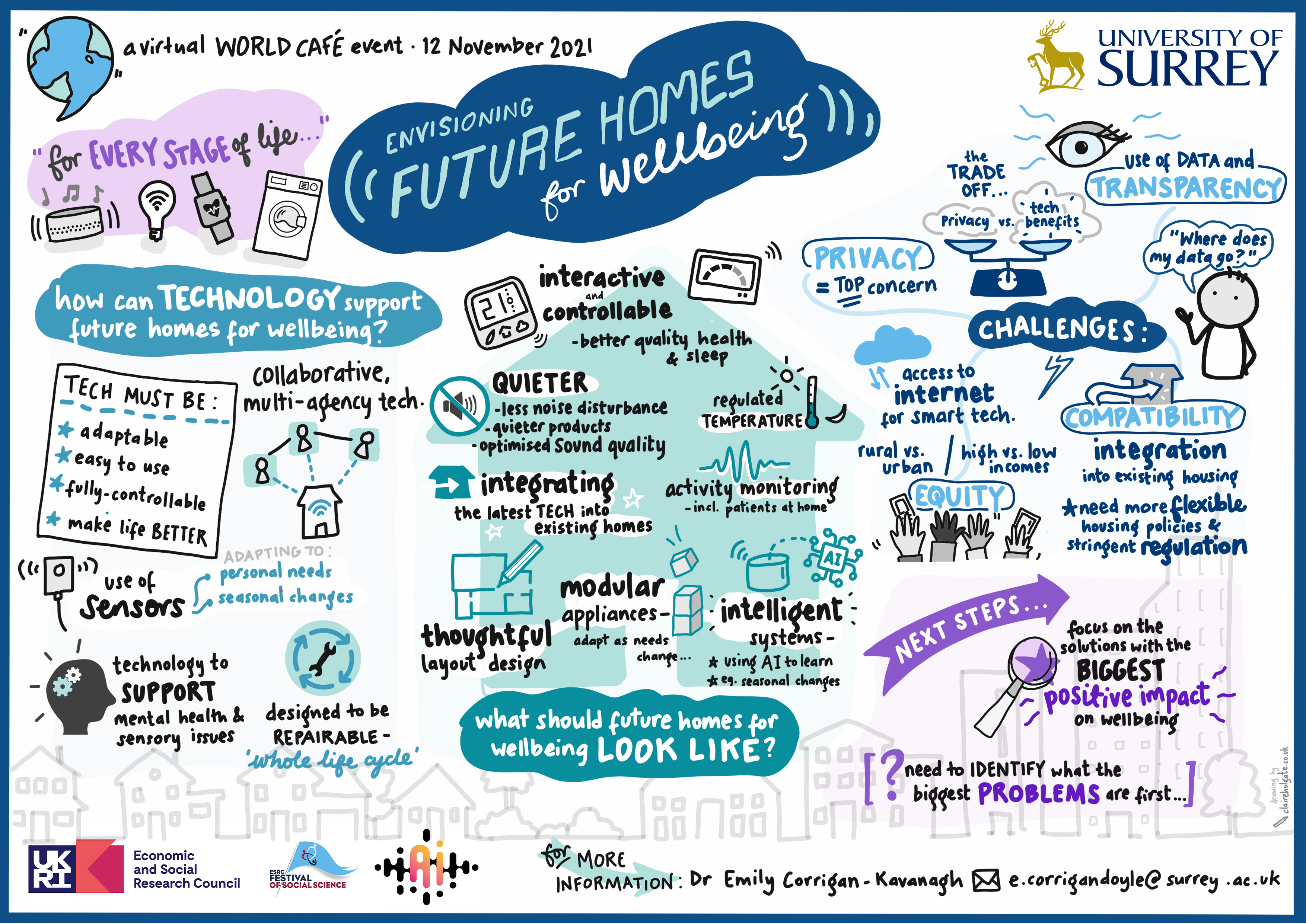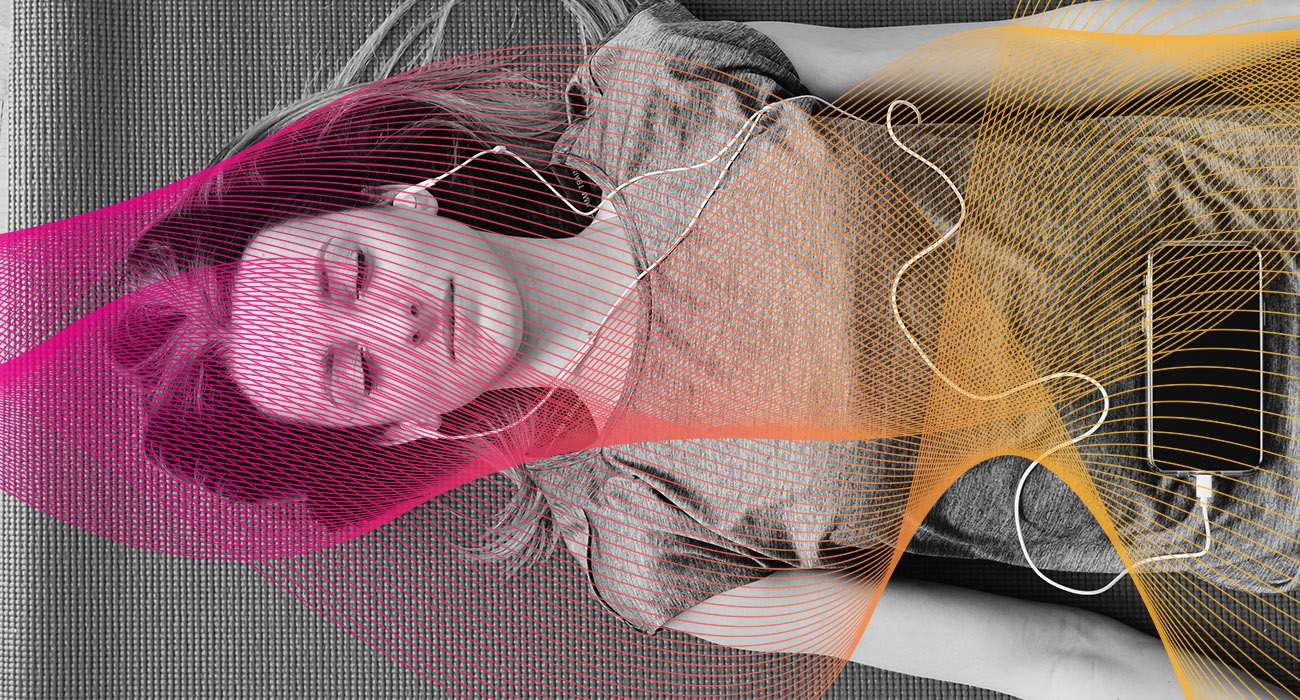Dr Emily Corrigan-Kavanagh led two events around tech for home wellbeing at Surrey in November, as part of the 2021 ESRC Festival of Social Sciences and to follow the launch of the new special interest group “Home Wellbeing”.
The first event, “Technologies for Home Wellbeing”, was held on 2nd November in the 5G/6G Innovation Centre and showcased a variety of research and technology in home wellbeing, including some poster and technology demonstrations from the Centre for Vision, Speech and Signal Processing (CVSSP) and the newly established Surrey Institute for People-Centred AI, a pan-university Institute that brings together world-leading AI and domain expertise across the different disciplines to realise and shape AI for public good.
The “Technologies for Home Wellbeing” event was divided into two parts (see programme):
- Part 1 “Research and Innovation in Technologies for Home Wellbeing”
- Part 2 “Future Technologies for Home Wellbeing”
Part 1 began with a keynote by Ian Spero who talked about the importance of supporting interoperability in future technologies for home wellbeing as well as co-creating digital infrastructures that have been co-designed with older adults.
Following this, Dr Aisling O’Kane began Speaker Session 1 by discussing the significance of considering the lived experiences of past, present, and future technologies to create and inspire those for everyday health and care at home such as how to co-design human-in-the-loop AI. Subsequently, Prof. Malcolm Fisk presented insights from his work on the European Commissioned LIV:IN project such as ethical tenets for products and services (e.g. accessibility and usability). Geoff Stevens followed with a presentation on Connected Places Catapult’s “Homes for Healthy Ageing Programme”, a programme that is looking to merge academic and industry research with innovative healthtech solutions and the insights and capabilities of local authorities and housing associations to create future homes for healthy ageing Dan Eades concluded this session with a spotlight talk on the smart home technology being developed by MyGlobalHome, such as sensors for indoor air quality monitoring, and the importance of transparent opt-in policies for gathering household data.
Over lunch attendees had the opportunity to explore a variety of poster on topics including “Automatic Monitoring of Wellbeing by Video” by Dr Frank Guerin and Dr Andrew Gilbert, and “Anomaly Detection for In-Home Sensor Data Using Machine Analysis” by Nivedita Bijlani, as well as related technology demonstrations and the MyGlobalHomeInnovation Centre.
Prof. Mark Plumbley commenced Speaker Session 2 by introducing the “AI for Sound” project and how this project is putting people at the heart of the development of new AI sound sensing systems to, for example, support assisted home living. Prof. Derk Jan-Dijk then presented research from the Surrey Sleep Research Centre (SSRC) such as how wellbeing and sleep quality are intrinsically connected and are negatively affected by the number of awakenings people experience during their sleep cycle. To finalise Part 1 Kirsty McMullan discussed findings from the “A Public Vision for the Home of 2030” public engagement project run by the Design Council, such as homes of the future should be fit-for-purpose, address the climate crisis and meet the needs for every stage of life.

Subsequently, Part 2 began with a series of 1-minute pitches from Part 1 poster presenters and a representative from MyGlobalHome to give new attendees a flavour of the different home technology and research on offer for exploration. Attendees were then invited to visit poster stands, technology demonstrations, visit the MyGlobalHomeInnovation Centre and submit questions around future technologies for home wellbeing for a follow-on discussion by an expert panel.
Part 2 concluded with an expert panel discussion with Ian Spero, Dr Andrew Gilbert, and Kirsty McMullan that highlighted the importance of developing home technologies that are sustainable, repairable and adaptable to existing infrastructures as well as supporting related digital eco systems with cross-platform compatibility to foster future homes for wellbeing.
The second event, “Envisioning Future Homes for Wellbeing”, was held on 12th November online over Zoom using a virtual world café approach, adapted from the “World Café” format. The event commenced with an initial presentation on the theme, after which attendees were divided between virtual Breakout Rooms with the organisers and invited to discuss two questions:
- What should future homes for wellbeing look like?
- PHow can technology support future homes for wellbeing?
Once everyone returned to in the main room, conversation highlights from the Breakout Rooms were shared by a representative from each to support a subsequent general discussion on how future homes for wellbeing could be enabled by technology. Emerging topics included supporting positive psycho acoustics in the home through AI that is adaptive and responsive to household sounds to maximise pleasant experiences, such as by masking unwanted spontaneous sounds during sleeping hours, and AI that can identify future health issues at home before they result in a negative health diagnosis
Overall, engagements from “Technologies for Home Wellbeing” and “Envisioning Future Homes for Wellbeing” events demonstrate academic and public interest in how future technologies, such as artificial intelligence, could support future homes for wellbeing. The breadth of related research represented and the enthusiasm of attendees to discuss the ethical and social implications of such technologies highlight a growing societal interest in creating future technologies that put wellbeing at the heart of their development.
Overall, engagements from “Technologies for Home Wellbeing” and “Envisioning Future Homes for Wellbeing” events demonstrate academic and public interest in how future technologies, such as artificial intelligence, could support future homes for wellbeing. The breadth of related research represented and the enthusiasm of attendees to discuss the ethical and social implications of such technologies highlight a growing societal interest in creating future technologies that put wellbeing at the heart of their development.
The timely establishment of the People-Centre AI Institute and associated research by the “AI for Sound” project adds momentum to this societal trend, bringing envisioned future homes for wellbeing closer to reality.
Special thanks are given to Prof. Mark Plumbley, Dr Helen Cooper, Andres Fernandes and Dr Arshdeep Singh on the “AI for Sound” project and to Nivedita Bijlani, Elaheh Kalantari, Julia Warsap, James King, Jingshu Zhang and Yanze Xu from the University of Surrey for all their support in making these events run smoothly.



